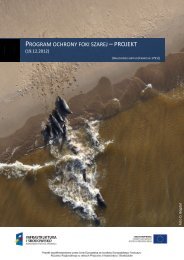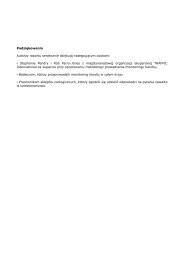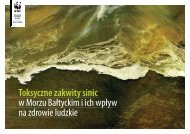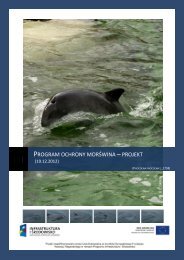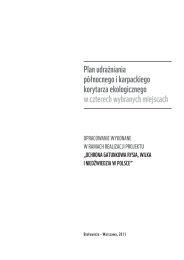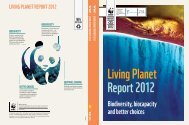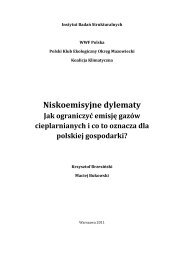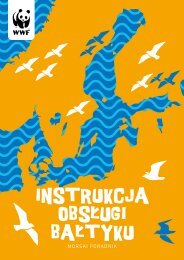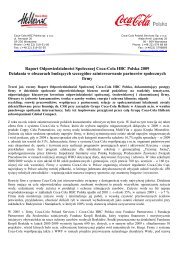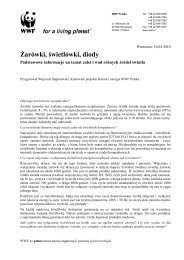COLLECTING GHOST NETS IN THE BALTIC SEA - WWF
COLLECTING GHOST NETS IN THE BALTIC SEA - WWF
COLLECTING GHOST NETS IN THE BALTIC SEA - WWF
You also want an ePaper? Increase the reach of your titles
YUMPU automatically turns print PDFs into web optimized ePapers that Google loves.
© <strong>WWF</strong> / P. Necel<br />
4. Disposal of the<br />
retrieved material<br />
Administrators of ports<br />
and harbours are obliged to develop<br />
and implement waste management plans<br />
for waste generated by vessels.<br />
4.1. The obligation of reporting cases<br />
of net loss in the light of regulations<br />
concerning sea fishing and the<br />
procedures applying to ghost nets<br />
retrieved from the sea<br />
The formalities connected with reporting cases<br />
of net loss have been regulated by EU sea fishing<br />
regulations and discussed in detail in the pilot project<br />
report. This also applies to the procedures for<br />
handling nets recovered from the sea. Nevertheless,<br />
it is also necessary to take into account the<br />
provisions of the Act of 12 September 2002 on port<br />
facilities for the reception of waste and cargo residues<br />
from vessels. Pursuant to this act, administrators<br />
of ports and harbours are obliged to develop<br />
and implement waste management plans for waste<br />
generated by vessels. In areas falling within the<br />
jurisdiction of the Maritime Office in Szczecin, such<br />
plans are developed for all non-communal ports<br />
and harbours, including beach harbours.<br />
For example, the plan for the harbour in Niechorze<br />
contains a detailed description of procedures for the<br />
reception, transport, recycling, treatment and disposal<br />
of waste. The plans for ports and harbours<br />
of the central coast (under the authority of the Maritime<br />
Office in Słupsk) were developed with a considerable<br />
delay (e.g. the plan for the port in Rowy<br />
was not consulted with port users until the 8th<br />
of February 2013).<br />
The section below describes the current situation<br />
with respect to vessel-generated waste management<br />
in Polish fishing ports, with particular emphasis<br />
on fishing nets retrieved from the sea (recovered<br />
by fishing vessels or supplied by the Border<br />
Guard or Fisheries Inspectorate officers). The information<br />
was obtained from interviews with masters<br />
of ports under the authority of Maritime Offices or,<br />
in the case of communal ports, with the chairmen<br />
or environmental officers of Port Authorities.<br />
Apparently, all ports have developed plans for the<br />
management of vessel-generated waste, including<br />
fishing gear; so far fishing gear has only been<br />
disposed of at landfills, rather than recycled.<br />
22 <strong>COLLECT<strong>IN</strong>G</strong> <strong>GHOST</strong> <strong>NETS</strong> <strong>IN</strong> <strong>THE</strong> <strong>BALTIC</strong> <strong>SEA</strong>



